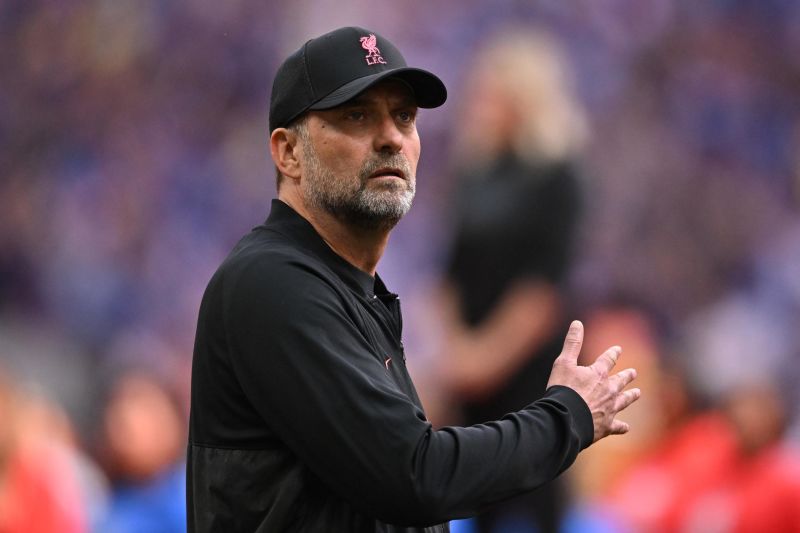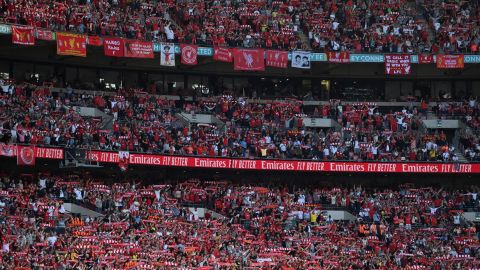
CNN
—
Liverpool faces Ajax in the UEFA Champions League on Tuesday, but the standout question to Reds manager Jurgen Klopp ahead of this match was not about his team’s poor form, it was whether fans would respect a minute’s silence for Queen Elizabeth II.
Asked about the club requesting a minute’s silence before the match, Klopp said: “Yeah, I think it’s the right thing to do.
“But I don’t think our people need any kind of advice from me for showing respect.”
The German referred to his team’s fans uniting with Manchester United fans at Anfield last season in support of Cristiano Ronaldo and his family following the death of his baby boy.
“There were plenty of examples where our people showed exactly the right respect,” Klopp added.
“One which surprised me, and I was really proud of that moment, was last year when we played Man United around the very sad situation around Cristiano Ronaldo’s family, and that’s what I expect.
“For me, it’s clear that’s what we have to do. That’s it.”
But why was Klopp asked whether he hoped that the tribute – requested by the club itself – would be respected by the Anfield faithful?
In May, some Liverpool fans booed throughout the singing of “Abide With Me” and “God Save the Queen” before last season’s FA Cup final at Wembley. They also booed Prince William when he appeared on the pitch.
The UK’s Prime Minister at the time, Boris Johnson, condemned those who booed.
After that match, Klopp said the booing of the English national anthem was “not something I enjoyed,” but also said: “It’s always best to ask the question, ‘Why does this happen?’ They wouldn’t do it without a reason.”
The fans’ reaction at the FA Cup final became headline news in the UK. But it wasn’t the first time it had happened.

Fans had had the same reaction to the national anthem at the Carabao Cup final in February – and at the 2012 FA Cup final. It is the way some of the club’s supporters voice their opposition towards the establishment, and it’s a chance to do so before a worldwide audience.
Speaking to BBC Radio Merseyside in May, John Gibbons from Liverpool fan podcast The Anfield Wrap said: “It’s something Liverpool fans feel strongly about. It’s a city that wants to be vocal about how we think this country should be and how we should live in a fairer society.”
Liverpool was a city that particularly suffered during the deindustrialization of the UK economy in the 1970s and 1980s. In 1981, appalling economic conditions, combined with tensions between the police and the African-Caribbean community, resulted in nine days of riots in the city.
In the aftermath of the unrest, Margaret Thatcher’s government talked of a “managed decline” of the city.
During this decade of Conservative rule, Liverpudlians came to see themselves as outsiders, separate from the rest of the country, and the state’s handling of the Hillsborough disaster in 1989 further entrenched those anti-establishment feelings.
READ: 30 years of dreaming – Liverpool’s agonizing wait for English football’s biggest prize
Booing of the national anthem at football matches when the team played at Wembley – which was frequent given Liverpool’s dominance of English football in this era – became widespread and remains so today. The reaction to it in the English media is still one of shock.
The UK is once again in an era where millions of people in the UK are either suffering economic hardship or are facing the prospect of what is being described as a “cost of living” crisis this winter.
Social and economic inequality is something that continues to anger many in the left-leaning city. Significantly, it was Liverpool and Everton supporters who started Fans’ Supporting Foodbanks in 2015, an initiative which aims to tackle food poverty in the UK.
In the same interview in May, Gibbons said: “Maybe, come up to Liverpool and speak to people and visit the food banks and see how some people in this city are struggling.”
According to journalist Tony Evans, at the FA Cup final of 1965, Liverpool fans began singing “God Save Our Team,” and by the 1970s, “the booing was growing louder.”
“Now, it is an ingrained Wembley tradition,” he wrote earlier this year.
That, of course, doesn’t necessarily mean fans will boo Tuesday night’s minute’s silence to honor Queen Elizabeth at Anfield.
